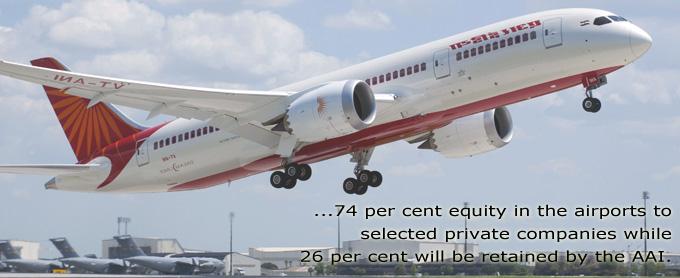|
Six Indian airports have been put on the fast track for privatisation by the Ministry of Civil Aviation. The six airports - Ahmedabad, Chennai, Guwahati, Jaipur, Kolkata and Lucknow will be going for international bidding in the first phase by December 2013. The aviation ministry has identified 15 airports, currently handled by the Airport Authority of India (AAI), for privatisation during the current fiscal.

The Indian airports privatisation plan has been revived after being stuck for years. The civil aviation ministry is in talks with related agencies for finalising bidding criteria, documents and consultants to execute a privatisation plan that envisages offering 74 per cent equity in the airports to selected private companies while 26 per cent will be retained by the AAI.
As per the revised privatisation plan, the tariffs for a concession period of 30 years will be decided in one go and a price adjustment mechanism will be built in as part of the agreement to avoid multi-fold price escalation.
The Chennai and Kolkata airports will be offered to the private developers in the first phase. The privatisation process has already been set into action by the inter-ministerial group’s approval in July 2013.
AAI on its part has began the process of privatising the Chennai airport by issuing a notice to select a legal adviser for "development, operation and maintenance.” After selecting a legal advisor, AAI will also rope in a financial consultant and a HR consultant. All these formalities, including appointing consultants, preparing tenders and identifying the company or consortium, are expected to take more than a year.
The privatisation of Indian airports was set in motion way back in 1999, when a greenfield airport was set up in Cochin under the PPP route. This was followed by two concession agreements signed by the aviation ministry with GVK and GMR in 2004 for setting up international airports in Bangalore and Hyderabad respectively. Both these airports were developed at a cost of Rs 1,500 crore each.
Two years later, in 2006, the aviation ministry signed concession agreements with GMR and GVK for expansion and modernisation of New Delhi and Mumbai international airports. Thereafter, the privatisation process was grounded following global economic slowdown, opposition by AAI employees, etc.
Even though the privatisation route has allowed development of efficient world class airports in India and has fuelled the growth of air traffic in India, not all are in favour of it. Especially employees of AAI, who fear losing their jobs when private developers take over.
The aviation ministry’s move to privatize the Chennai and Kolkata airports after their modernization by the AAI has come under severe criticism from certain quarters. Analysts feel that privatisation at this juncture will only increase the operational cost of the airports leading to a hike in fare rates for passengers.
India has 456 airports and airstrips spread all over. However, only 84 are currently operational. Investment in new airport capacity, along with more efficient usage of existing capacity, is essential if the airport infrastructure in India is to meet future growth in demand in a sustainable way.
The government estimates that Rs 67,500 crore would be required to develop and modernise Indian airports during the 12th Plan period, of which AAI would contribute Rs 17,500 crore. The remainder Rs 50,000 crore is supposed to come from the private sector. Thus, a transparent partnership between airlines and private sector or public sector airports is important to meet this challenge successfully.
|